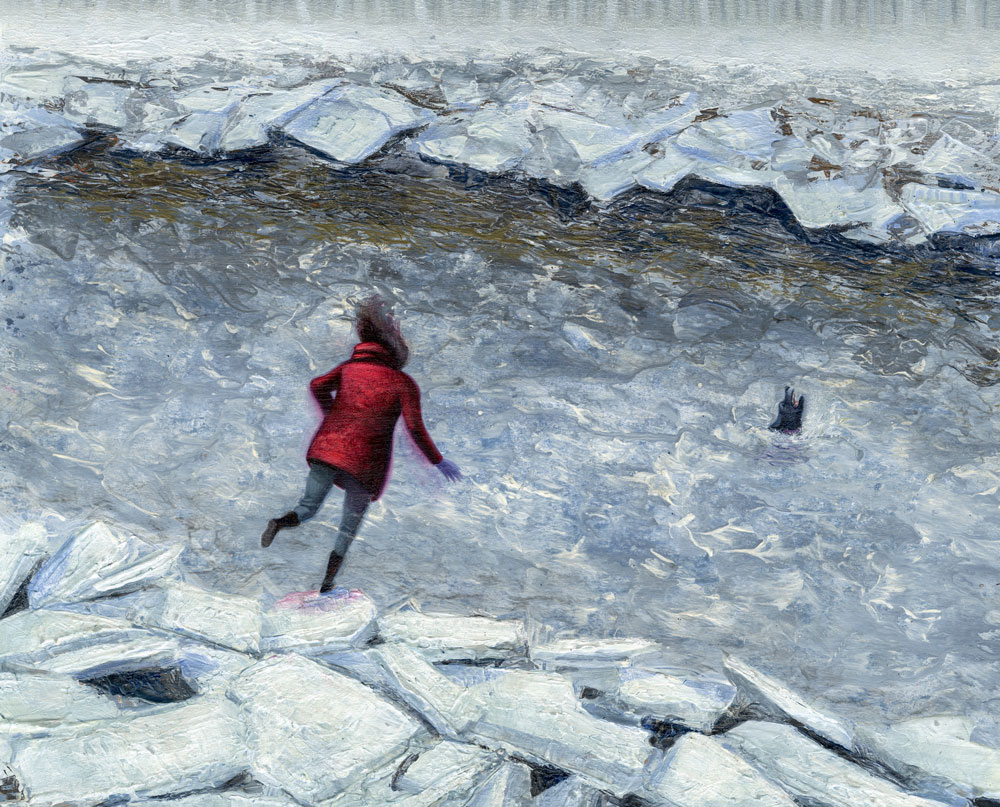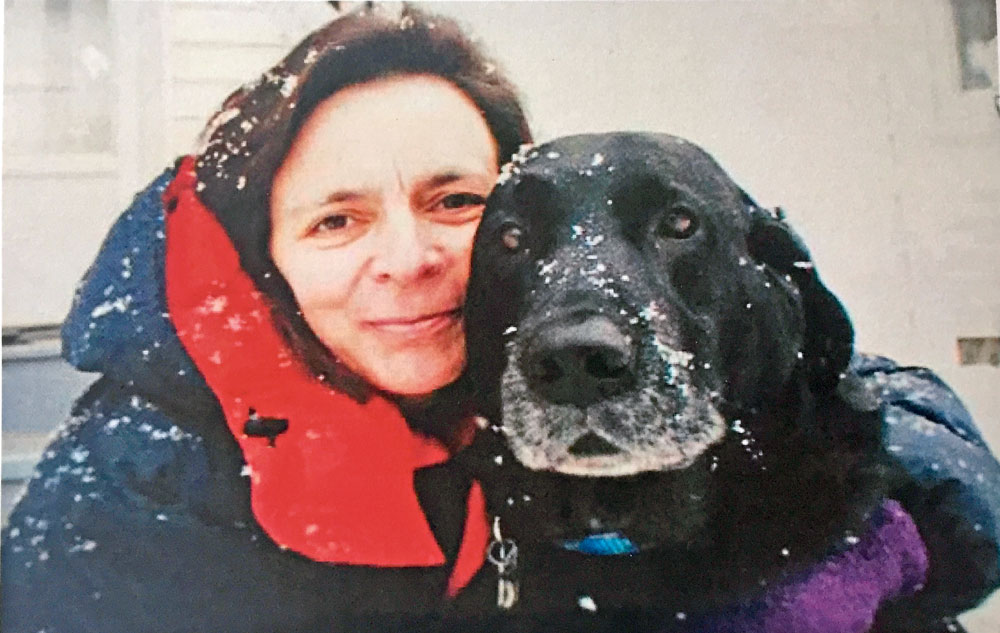It Is Easy to Drown in a Freezing River
When You Fall into a Freezing River in Maine, the Will to Live Can Be Measured by the Need to Save One You Love. If you fall into a river after a flood, when slabs of ice cover the banks, and if the water is up to your chin and you look up at those […]

It Is Easy to Drown
Photo Credit : Jon KrauseWhen You Fall into a Freezing River in Maine, the Will to Live Can Be Measured by the Need to Save One You Love.
If you fall into a river after a flood, when slabs of ice cover the banks, and if the water is up to your chin and you look up at those three feet of ice slabs, you know, because your mind tells you, that you can’t possibly climb out of the water, that you might die.
 It Is Easy to Drown
It Is Easy to Drown
Within two minutes, when you lift your gloved, numb hand from the water and an excruciating pain makes your fingers want to break off, you stare at your hand as if it belonged to someone else, and then you pull it back into the water. It’s better in the water.
Maybe the sun is out and the air is unseasonably warm, but the water, you remember, is as frigid as floating, watery ice. Yet you’re not cold.
—
It was another of those rare mild January days in Maine’s western moun-tains, and a friend had stopped by, saying, “Get the kids outside; it’s warm.”
The Sandy River, I thought. I’d been wanting to get down there for two days, after the rains had come, and the river had flooded, breaking up the ice, which had resettled on the banks. The sky was as blue as my great-grandmother’s eyes and the air almost balmy, as my mother would have called it, when my daughter Ting, her friend, and I headed down the little streets of Phillips to the orange gate. Gus, my Lab, stepped happily ahead of us, his thick black coat glistening like onyx, his tail raised and wagging.
Three of Ting’s third-grade classmates had joined us, so with five kids in tow, I gave them the “This is the deal” talk at the gate: “No one goes past the end of the trail, and no one goes on the ice along the banks. Understand?” I looked each one of them in the eye for emphasis.
But kids, being kids on a blue-sky day when nothing could possibly hurt them, were suddenly on the ice. “Off!” I yelled. “Now get back!” As they scrambled off the ice and through the snow to the almost-bare ground, I caught a glimpse of a black tail down below the ice, in the fast-running waters of the Sandy.
Lying flat on my belly on a slippery ice slab, I gazed in shock three feet down at the river. Gus’s eyes, as he swam back and forth looking for a way out, showed primal fear.
I couldn’t reach him; he wouldn’t come to my hand. “Come here, little guy,” I called. “Gussy, come, come here.”
Back and forth he swam, but now he was whimpering. One swoop close by and I had his collar, but he pulled away. “No, Gus, come, come here.” Then he was off again.
I saw a tiny outcropping of ice, maybe three inches, sticking out of the slabs about halfway down, so I shifted over to it. Sitting up, I removed my boot and sock, yanked one leg of my corduroy pants as high as it would go, and gingerly tested the water’s depth. If I could stand … but no, I couldn’t touch bottom at a spot that in summer is the gentle slope of a beach leading to briskly cool water.
Gus was crying now, looking wildly in every direction.
I turned to the kids: “Run for help, now! Get Larry—he’s working at Skip’s and can bring his truck to the gate. Fast!”
One child stayed, at my request. “Just in case,” I said. I didn’t know what the “just in case” might be, but within a minute I fell into the river and found out. The child cried out, “I’m scared.” Already in shock, I tried to calm him: “I’m not scared—don’t you be scared. Be brave. Just run. Get help.”
A blanket of cold wound around me then, right up to my neck. I was breathing hard, but I, the person I was, had gone away. There was only Gus. “Keep trying,” I begged him. “Get those paws up, and I’ll push.” With the stumps that my hands and arms had become, I kept pushing, but Gus didn’t budge. Where was my strength?
My feet rested on an icy rock. When the current pulled me off, I had to move my arms to keep my head above water. Then came the rearranging, again, of Gus. “It’s, okay, Gus, just keep trying.” I must have been speaking to myself, for Gus could try no longer. He held on out of terror, but he couldn’t try.
When the current pulled me away, floating me downriver for several seconds, a blissful peace overcame me. I was going, I realized. I was dying. The river would be my home. “I’m coming, Penny,” I whispered to my dear friend, gone now these two years.
But my ears caught that crying sound again. Gus, it was Gus, and he needed me. I was swimming back against the current, but so slowly. I was a swimmer, but why couldn’t I go any faster? “Gus,” I was crying, “hold on!” Then, as I reached him, “Help!” came from deep within. “Someone, anyone, help, help me!”
Once, I lifted my gloved hand out of the water, and a bitter pain turned my fingers to glass. Would they break off? Back in the water. I held Gus’s back legs and tried to support as much of him as I could with my shoulder.
Above us loomed the wall of ice.
Then Melissa came. Small Melissa, but she had worked in construction, and when she saw me, something pumped through her, some inner reserve of strength. I could see it. She found her footing on the slanted ice slabs, yelled at the kids to stay back, and in one swoop pulled Gus out. To the kids, “Get Gus to the car, now, and fast!”
“Go, Gus,” I whispered, thinking that I was starting to sink.
“Give me your hand,” Melissa was saying.

Photo Credit : Franklin Journal File Photo
I did, and she yanked. Melissa’s legs fell through the crusty snow as she dragged me out and onto an ice slab. “I can’t move,” I said. Melissa was pulling herself out of the snow; her legs were soaked with river water. Somehow she stood me up and ripped off my down jacket and turtleneck, then wrapped me in her own jacket.
The shivering and shaking took over then, but Melissa’s hand gripped my waist as she pushed me forward for 20 or more steps. The gate was so far away, though. I bent, nauseated, too weak to go on. “I can’t do it,” I told her. Melissa scooped me up into her arms.
When they slid me into the waiting ambulance—Ting and her friend had found someone finally and told him to call 911—I was crying. “Where’s Ting? And Gus? Where is he?” Even, “I want my mother.”
“What’s her number?” asked the EMT, a woman named Jane, with a golden halo of hair around her head. She was cutting my clothes off.
“Please, not those corduroy pants— my daughter-in-law gave them to me—I need them,” I told her, so Jane, my angel, pulled them off.
“What’s your mother’s number?” she asked again.
“She’s dead. I can’t call her.”
I was still in the water, wasn’t I? The shivering hadn’t let up; the feeling that I didn’t exist kept on. I was being wrapped in warm white blankets, even my head. I was swaying and trembling and crying for the ones who’d already gone, for wanting to see my three children and my two grandbabies. Why couldn’t they be here? Why couldn’t Ting come with me in the ambulance? “Where’s Gus?”
Jane placed her hand on mine, beneath the blanket. “Maybe you can feel your mother through my hand.” The first moment of calm began.
“Body temp is 91,” I heard.
“Can’t get an EKG—she’s trembling too much.”
“Blood pressure?”
I saw a thumb turn down.
The doors closed, and we were off to the hospital. Another ambulance would meet us partway with a medic who could do more.
“The water saved me,” I finally said. “It was a blanket.”
In the trauma room, following injections of blood thinners, needles to draw blood, needles to transfer fluids into me, I began to feel myself again. Two heads poked in: my buddies, who’d seen me through the last couple of years, Larry and Skip.
I was covered with a papery white blanket with holes on one side that blew warm air all over me. The doctor waved them in.
“We’d like to admit you,” he told me. “Your heart’s still giving off enzymes. That means you’re not out of the woods yet. Cardiac arrest can occur at a certain point. You’re quite near that.”
As I was lifted onto a stretcher, I heard Skip say, “I’ll go out to Phillips and get Ting, bring her in to be with you.”
“Oh, thank you. And Gus?”
“He’s just fine.” It was Larry saying those words; Gus loved Larry, so I knew it was true.
“Did I tell you the water saved me? It was a blanket.”
Then Ting was there, snuggled up against me in her pjs. “Are you going to die?” she asked.
“You’re holding me so tight, I can’t possibly die,” I said.
—
It was after 8:00; the dark night protected us. The nurses had closed the door so that the only light came through the curtained window to the nurses’ station. “Mama, sing to me,” Ting said.
I was past exhaustion, but I started to sing the lullabies and songs I’d sung to her when she first came from China to join my family when she was 2 years old. At times I’d start to drop off to sleep. “Keep singing,” Ting told me. She joined me. At some point, near midnight, we fell asleep in each other’s arms, her heart against mine.


